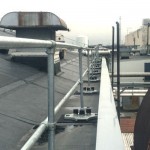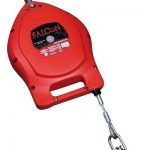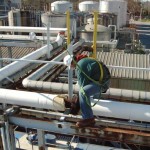June 13, 2016, 3:23 pm | by Ray Nardo
 Fall protection anchor points are a versatile tool that with proper design, installation and use can protect workers in a variety of situations. Without all three of these factors being present, there is the possibility that a worker may have the illusion of being protected with the reality of being no more safe than working without any fall protection at all. Read more.
Fall protection anchor points are a versatile tool that with proper design, installation and use can protect workers in a variety of situations. Without all three of these factors being present, there is the possibility that a worker may have the illusion of being protected with the reality of being no more safe than working without any fall protection at all. Read more.
March 1, 2016, 12:50 pm | by Ray Nardo
 Numerous fall protection design and engineering challenges are presented for guardrail systems installation on multi-level rooftops. This article discusses the issues faced by designers, engineers and individuals responsible for the installation. Read more.
Numerous fall protection design and engineering challenges are presented for guardrail systems installation on multi-level rooftops. This article discusses the issues faced by designers, engineers and individuals responsible for the installation. Read more.
December 10, 2015, 4:43 pm | by Ray Nardo
Much Forethought Goes Into Proper Fall Protection Installation
 From a fall protection installation standpoint, the primary goal of the system being installed is to protect workers. The objectives are to get the right system, at the right price, installed on time and on budget, with minimal disruption to the normal activities of the business. Read more.
From a fall protection installation standpoint, the primary goal of the system being installed is to protect workers. The objectives are to get the right system, at the right price, installed on time and on budget, with minimal disruption to the normal activities of the business. Read more.
November 17, 2015, 9:53 am | by Ray Nardo
Pre-Plan Fall Protection On New Construction During The Design Phase
 For new construction projects, we are often asked to bid on procurement and installation of fall protection equipment. All too often, we find that it is treated as an afterthought, rather than an integral component of a well-designed building. We are alarmed whenever a contractor who has asked us to bid a project says, “They will add that later”, when we point out that the plans and specifications either say nothing about fall protection, or mention it without providing any scope, location or other layout information. Read more.
For new construction projects, we are often asked to bid on procurement and installation of fall protection equipment. All too often, we find that it is treated as an afterthought, rather than an integral component of a well-designed building. We are alarmed whenever a contractor who has asked us to bid a project says, “They will add that later”, when we point out that the plans and specifications either say nothing about fall protection, or mention it without providing any scope, location or other layout information. Read more.
August 28, 2014, 10:51 am | by Ray Nardo
 When discussing the effectiveness of certain types of fall protection equipment, there is a debate going on these days over which type of connector is best: self-retracting lifelines (SRLs) or 6-foot shock absorbing lanyards (the connector is the device that links the body harness to an anchorage, such as an overhead fixed track or single-point anchor points). It is our opinion that SRLs are the best type of connector. Yes, lanyards are less expensive, but SRLs provide more effective fall protection, and are worth the extra money you spend. Read more.
When discussing the effectiveness of certain types of fall protection equipment, there is a debate going on these days over which type of connector is best: self-retracting lifelines (SRLs) or 6-foot shock absorbing lanyards (the connector is the device that links the body harness to an anchorage, such as an overhead fixed track or single-point anchor points). It is our opinion that SRLs are the best type of connector. Yes, lanyards are less expensive, but SRLs provide more effective fall protection, and are worth the extra money you spend. Read more.
April 11, 2014, 2:18 pm | by Ray Nardo
 As a facility manager in charge of worker safety on elevated job sites, it’s important to understand the differences between OSHA regulations and ANSI standards when developing your fall protection program.
As a facility manager in charge of worker safety on elevated job sites, it’s important to understand the differences between OSHA regulations and ANSI standards when developing your fall protection program.
By understanding these differences, you are better able to:
- Avoid stringent fines for non-compliance;
- Reduce fall hazards and related accidents;
- Improve worker safety and productivity; and
- Decrease lofty workers’ compensation claims.
Read more.
March 28, 2014, 2:49 pm | by Ray Nardo
 Conducting annual lifeline inspections goes hand in hand with proper training of your workers. Your equipment isn’t protecting anyone when it has missing, worn or defective components. Worse, it can create an unwarranted illusion of security. Installing fall protection equipment in your workplace is a great first step towards keeping your employees working at heights safe from fall hazards. Read more.
Conducting annual lifeline inspections goes hand in hand with proper training of your workers. Your equipment isn’t protecting anyone when it has missing, worn or defective components. Worse, it can create an unwarranted illusion of security. Installing fall protection equipment in your workplace is a great first step towards keeping your employees working at heights safe from fall hazards. Read more.
March 14, 2014, 3:59 pm | by Ray Nardo
 While a comprehensive or strategic fall prevention or protection plan is certainly admirable, advantageous and the right long-term solution, it’s not always practical to implement all at once. The implementation of a complete solution is often a costly and time-consuming undertaking.
While a comprehensive or strategic fall prevention or protection plan is certainly admirable, advantageous and the right long-term solution, it’s not always practical to implement all at once. The implementation of a complete solution is often a costly and time-consuming undertaking.
Do you have to implement a comprehensive solution all at once, or piecemeal the installation? Read more.
February 9, 2014, 7:40 pm | by Ray Nardo
 Did you know that nearly 400 people in the construction industry alone die each year due to injuries caused by falls? Not only that, but these accidents also cause many other serious injuries including incapacitation, broken bones and fractures, and long-term medical complications such as brain and spinal cord trauma.
Did you know that nearly 400 people in the construction industry alone die each year due to injuries caused by falls? Not only that, but these accidents also cause many other serious injuries including incapacitation, broken bones and fractures, and long-term medical complications such as brain and spinal cord trauma.
As the manager of your facility, it’s your job (and OSHA-enforced responsibility) to protect employees’ well being while working from heights. While worker safety should always be the number one priority, the financial impact to the business also has great potential for damage.
Read more.
 Fall protection anchor points are a versatile tool that with proper design, installation and use can protect workers in a variety of situations. Without all three of these factors being present, there is the possibility that a worker may have the illusion of being protected with the reality of being no more safe than working without any fall protection at all. Read more.
Fall protection anchor points are a versatile tool that with proper design, installation and use can protect workers in a variety of situations. Without all three of these factors being present, there is the possibility that a worker may have the illusion of being protected with the reality of being no more safe than working without any fall protection at all. Read more.








